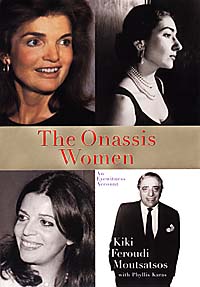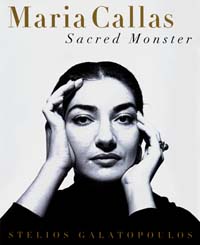Book Reviews
The Onassis Women: An Eyewitness Account
Fri., July 2, 1999
|
|
by Kiki Feroudi Moutsatsos with Phyllis Karas
Putnam, $25.95 hard
Maria Callas: Sacred Monster
by Stelios Galatopoulos
Simon & Schuster, $35 hard
There's something about The Onassis Women by Kiki Feroudi Moutsatsos that rings a bit hollow, and it's Kiki herself. She is the only character in the book who has no public reputation, and she doesn't give us much to go on. Consequently, we are forced to use our imaginations (I just hate that in a tell-all book), and my imagination chose to cast Kiki as a little Pekinese dog -- jittery and loyal, but ultimately of little interest. She did occupy, however, a very interesting position; she was Aristotle Onassis' personal secretary. That information alone had me drooling with anticipation, so I grabbed the book and a bib, and settled down for a lovely read on one of my favorite subjects.
The women referred to in The Onassis Women are Ari's daughter Christina, diva Maria Callas, and, of course, Jacqueline Kennedy Onassis. We also spend time with Aristotle's three sisters, Artemis, Merope, and Kalliroi, who serve as a sort of Greek chorus and close confidantes to little Kiki. Unfortunately, the author has an annoying habit of calling all these women by their first names, preceded by "Mrs." Therefore, we are inundated with "Mrs. Artemis," "Mrs. Merope," and worst of all, "Mrs. Jackie," which somehow lends a very Hazel-ish cast to the whole story. The effect, of course, is to impart a sense of distance between Kiki and her employer's family, but the technique also imparts distance between the reader and the story. These mythic figures come off as very one-dimensional in a story dripping with passion and intrigue.
A few chapters into Kiki's story, I felt it necessary to put the book down and imagine that I was Kiki herself: "Good morning, Mrs. Jackie. You look lovely today," and "May I bring you some coffee, Mrs. Jackie?" It was almost too glorious for words. Almost, dear reader, but not quite. In fact, that "Mrs. Jackie" business had to go. I tried again, assuming the formality that I felt was necessary: "Good morning, Mrs. Onassis. You look lovely today." It was sublime. I was giddy with ecstasy. Suddenly Kiki's story came alive. Briefly.
|
|
I get the distinct feeling that Kiki knows a lot more than she reveals, even if she did wait until everyone in the book was dead before she talked about them. The new information that she includes has to be painstakingly extracted, as if mining for gold, but once acquired, it's as disappointing as finding pyrite. We learn that Onassis cursed a lot, was extremely self-centered, and could be very careless with cash (he once dropped two million dollars on the floor of an elevator and was unaware of it). We learn that he could be penurious and treacherous -- when Callas heard that her "Aristo" was going to marry the widow Kennedy, she fled Skorpios, leaving behind her jewelry. Aristo gave it to Jackie, presumably not mentioning where it had come from. Tack-ee.
We do get to hear a great deal about Jackie and Christina, but Kiki's coverage of Maria Callas and her long-running affair with Onassis is spotty, at best. This cannot be held against the author -- it's really just a testament to both Onassis' and Callas' obsessive need for privacy. While we already know virtually everything possible about Jackie's life from the moment of her birth until the moment she died, and Christina's short, tragic life has been reasonably well-illustrated, it is Maria who cries out for illumination.
Maria Callas' life contained all the elements of the epic dramas she sang. By the age of 17, most of European society was beginning to genuflect at her altar. La Scala, The Paris Opera, and Covent Garden, all of them falling all over themselves to offer her an engagement. Maria Callas: Sacred Monster by Stelios Galatopoulos is the work of a man possessed. Mr. Galatopoulos adores his subject and experiences the ultimate fan fantasy: He became her confidante. This is his third book on La Callas, and he knows his subject well. His idol worship is not blind but he never stoops to dish the dirt. He loves Callas too much to betray her by offering the detritus of her life for public consumption.
Instead, he offers up her achievements and history in a respectful and elegant package that is lavishly illustrated with many rare photos of Callas in performance. Though a little scholarly, and even dry, Sacred Monster fills a need for record-keeping purposes, and for those who are interested, an introduction to a fascinating personality. It is a play-by-play account of her career, with its highlights as well as its lowlights, and no one knows them better than Mr. Galatopoulos. If he wasn't there to witness the events himself, he hears about them firsthand. From Maria, a diva of the old school. And as far as what are loosely called "divas" today? Sorry, VH1, but Mariah Carey and Brandy, please pick up your tickets to oblivion at Will Call. --Stephen Macmillan Moser










